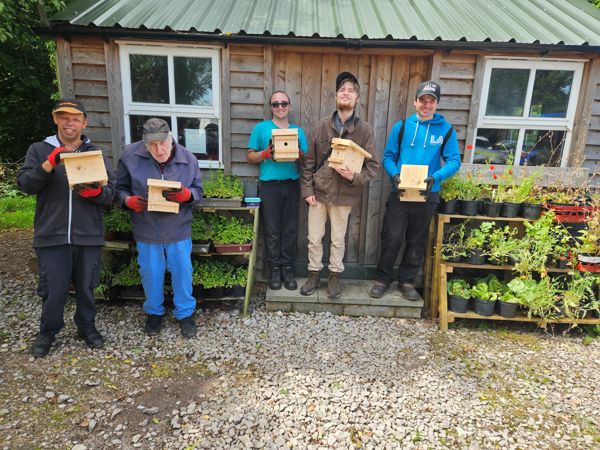Local partnership helps protect critically endangered dormice in North Wales

A community-led project is helping protect one of Britain’s most endangered mammals, thanks to a partnership between Natural Resources Wales (NRW) and the Bodfari Woodland Skills Centre.
This year, specially designed nestboxes for dormice have been built for the first time at the centre using local timber sourced from NRW’s Clocaenog Forest. A local contractor with timber milling facilities prepared the wood before it was turned into nestboxes by volunteers at Bodfari.
All boxes are used exclusively on NRW land. One of the main monitoring sites is Coed y Fron Wyllt, near Ruthin, where boxes are checked four times a year to gather data and support the species' recovery.
The first dormouse boxes were installed around 20 years ago at Coed y Fron Wyllt (around 200 boxes), and we’ve been monitoring them ever since. As the boxes are exposed to the elements, their condition naturally deteriorates over time, so they need replacing when they’re no longer fit for purpose.
Hazel dormice are critically endangered in the UK, with numbers dropping by 70% between 2000 and 2022, according to the State of Britain’s Dormice report. They are a protected species under European law, making conservation work vital for their survival.
Glenn Williams, NRW Senior Officer Land Management, said:
“This is a fantastic example of how local partnerships can make a real difference for wildlife.
“Dormice are a vital part of our woodland ecosystems, and by involving communities in their protection, we’re helping both nature and people to thrive. These boxes will provide safe nesting places and help us monitor how dormice are faring in our forests.”
Rod Waterfield at Bodfari Woodland Skills Centre, said:
“We’re proud to be part of this important conservation work. Sustainability and community involvement are at the heart of what we do, so helping to build these nestboxes is a perfect fit.
“We run a Community Support programme on behalf of Social Services. Our participants have access to two allotments, a market garden, polytunnels, and an orchard. They also use a woodworking workshop where they make items for environmental groups such as North Wales Wildlife Trust and Hedgehog Rescue.
“This work gives our participants a real sense of purpose and shows how traditional skills can support modern environmental goals.”
